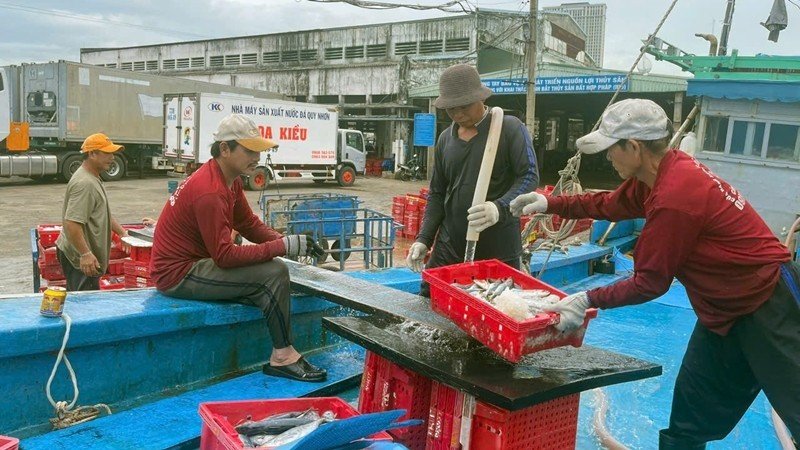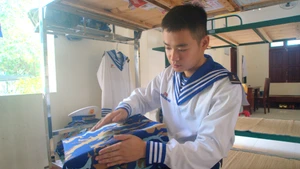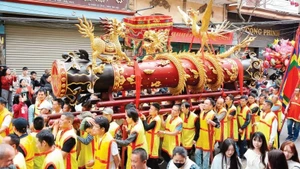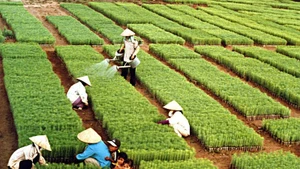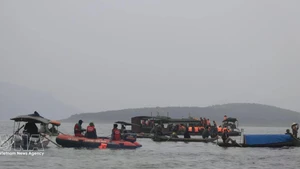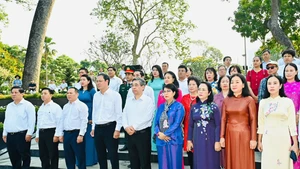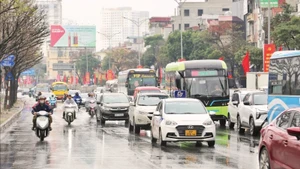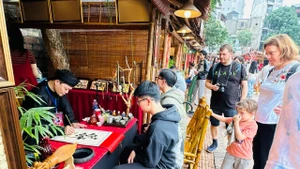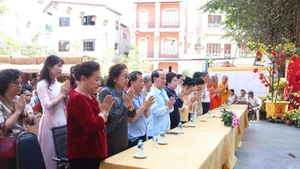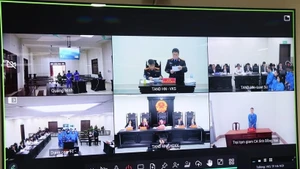An incomplete sea trip, but transparent records
In the salty dawn light of the sea breeze at Quy Nhon Fishing Port, crew members diligently lifted each crate of fresh seafood from the ship's hold. On the deck, a strong man quietly recorded in a notebook: time, date, sea coordinates, output. That is Huynh Chanh Thi, a veteran captain of the Hoai Huong Sea area, Hoai Nhon town (Binh Dinh), a living proof of the sense of responsibility of fishermen in the effort to trace the origin of aquatic products, prevent and combat IUU fishing.
Thi’s fishing boat BD 99007 TS docked at Quy Nhon Fishing Port after nearly 1 month at sea, carrying more than 30 tons of striped tuna. However, his face could not hide his sadness. “The price of fish is too low, it is only enough to cover the cost. This trip is one we will remain empty-handed from”, he said.
However, what makes Thi proud is still the fishing diary pages with every number accounted for.
When the boat just reached shore, Tran Dang Phuc Vu, an employee of Quy Nhon Fishing Port, approached to compare the declared data. “It is impressive, the output recorded in the book and the actual output are almost the same”, he said.
It is not by chance that Thi is considered a “typical fisherman” in strictly implementing the output declaration. Over the years, Thi has kept one thing unchanged: strictly following the declaration process and recording the fishing logbook.
“When preparing to cast the net, I look at my watch, determine the position, and clearly record the time and coordinates. After finishing a catch, I write it down again. Drifting at sea can be dozens of nautical miles, if I write it down incorrectly, it will be ruined,” he shared.
This is hard to imagine for outsiders, but after 35 years of wandering at sea, Thi has trained his eyes and imaginary scales to be almost infallible.
“In the past, there were no plastic crates, I just poured the fish into the ice storage tank and estimated the output. Now, each crate of fish is about 10kg, 100 crates is 1 tonne. Just calculate like that,” Thi said.
Overcoming the pressure to combat IUU fishing
Since the beginning of 2025, the ports and the Fisheries Department of Binh Dinh province have confirmed the origin of 133 records (2,576 tonnes), certified 60 records (more than 1,568 tonnes of fish), and not a single shipment has been returned.
These numbers demonstrate the efforts to make the marine industry transparent from the people who live off the fishing grounds. However, the implementation has encountered many difficulties.
However, the special thing in this recognition journey is... the professional spirit of the fishermen. They do it because they know that each fish caught, each net coordinate, each weighing slip is a “certificate” affirming that their profession is clean, standard and internationally recognized.
“If we catch fish legally, in licensed waters, we must be transparent to protect ourselves. Just like growing clean vegetables, if we do it properly, we must have a real certificate. Therefore, in addition to facing countless dangers, keeping a careful logbook is like preserving honour amidst the storms,” said Thi.
Dao Xuan Thien, Director of Binh Dinh Fishing Port Management Board, said that fishermen’s awareness of IUU compliance has changed significantly.
“100% of the ships upon arrival at the port proactively present their logbooks and cooperate well in inspections. However, according to EU regulations, each ship arriving at the port needs one supervisor. But if there are 30 ships arriving at the port in one night, where will 30 people come from? Therefore, Binh Dinh’s solution is... flexible.
We rely on the coordination between port officers, ship owners and traders. Therefore, in reality, one officer can supervise 5-7 ships at the same time, ensuring inspection while optimizing human resources,” Thien expressed.
Currently, budget problems also create a lot of pressure. Each confirmation of seafood origin currently charges a maximum of VND700,000/time, including VND150,000 in administrative fees.
In 2024, Quy Nhon Fishing Port will earn about 200 million VND from this fee, while the cost of human resources to supervise 3 shifts per day at Quy Nhon and De Gi ports will cost at least 500 million VND. “Every year, the province still has to pay a few hundred million/year to maintain operations,” said Thien.
More than anyone, they understand that if there is no origin and no transparency, those bloody fish catches... will not be able to be exported.
The seafaring profession is like a belief and keeping a careful logbook is like preserving honour amidst the storms. From the deep hold to the inspection desk, from the handwritten logbook to the close supervision of port officials..., all of these things will create a transparent and stable value chain so that Binh Dinh fishermen are no longer alone amongst the increasingly strict standards of the international market.
Despite the pressure, lack of human resources, lack of funding... Binh Dinh is still gradually making its mark as a leading locality in seriously implementing the fight against IUU fishing, so that the ships that sail back to shore not only bring fish, but also bring honour, trust and the future for one of the key economic sectors of the country.
